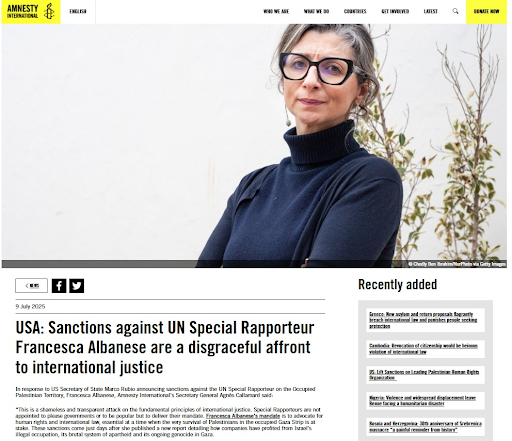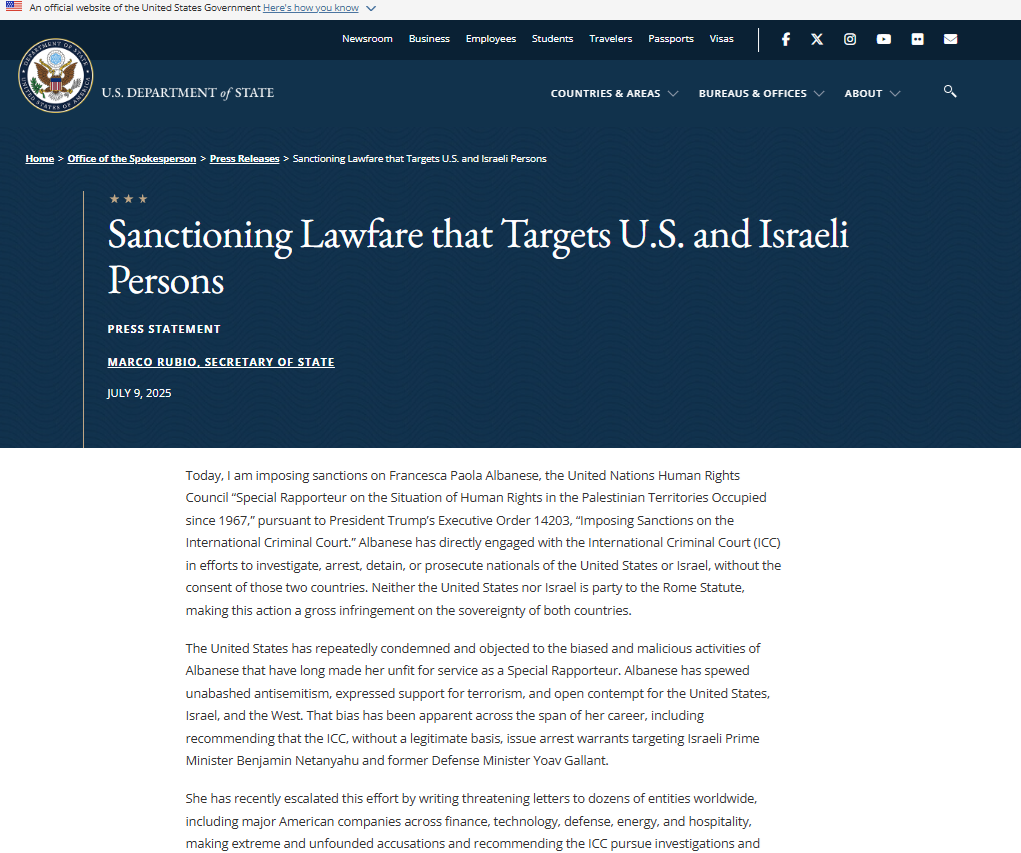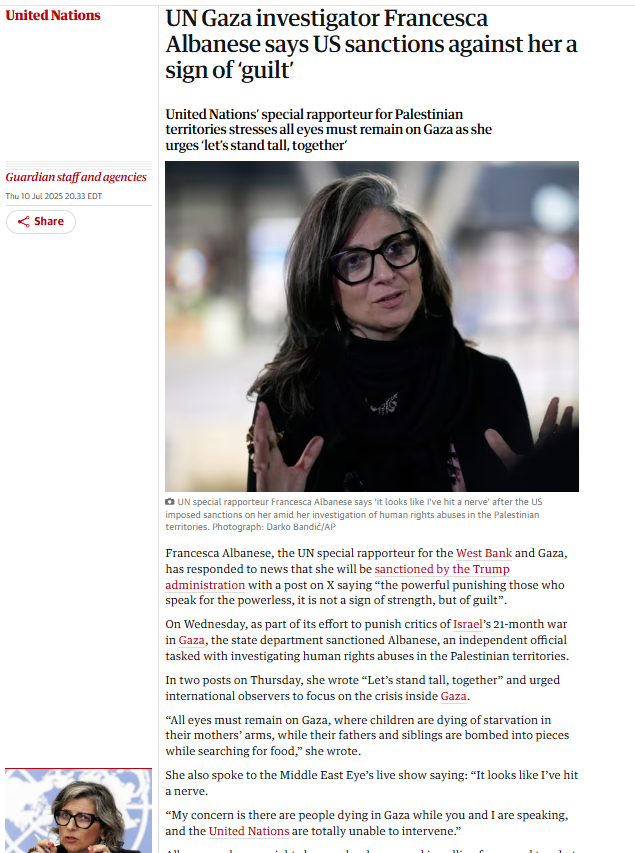Western Civilization's Values: From Weaponizing Human Rights to Silencing Truth
The Weaponization of Human Rights
For decades, the U.S. and its allies have invoked human rights to legitimize wars, sanctions, and regime-change operations—from Iraq to Libya to Syria. Human rights rhetoric served as a moral cover for imperialist aggression, allowing Western powers to posture as global arbiters of justice while violating the very principles they claimed to uphold. Yet when UN officials like Albanese apply these same standards to Israel and the U.S., they are met with sanctions, smear campaigns, and death threats.
Albanese, one of the few voices courageously documenting Israel’s genocide in Gaza, has been systematically targeted for her reports detailing war crimes, forced displacement, and mass starvation. Her office’s landmark study, "Genocide as a Means of Decolonization," meticulously exposes how Israel—with Western complicity—has turned Gaza into a slaughterhouse. Instead of heeding her warnings, the U.S. and its allies have chosen to shoot the messenger.
Punishing Truth-Tellers, Protecting War Criminals
The U.S. sanctions against Albanese follow a familiar pattern: silencing dissent while shielding perpetrators. When the International Criminal Court (ICC) issued arrest warrants for Israeli Prime Minister Benjamin Netanyahu and former Defense Minister Yoav Gallant, the U.S. retaliated by sanctioning ICC prosecutors. Similarly, British officials threatened to defund the ICC if it pursued justice for Palestinian victims. These actions confirm a simple truth: Western leaders believe accountability is only for their enemies.Albanese has also implicated corporations like Google, Amazon, Lockheed Martin, and MIT in profiting from Israel’s occupation, naming them as enablers of genocide. Rather than address these damning revelations, U.S. officials like Marco Rubio have smeared her as "anti-Semitic" and a "terrorist sympathizer"—a tactic long used to delegitimize critics of Israel. The goal is clear: to ensure that Palestinian suffering remains invisible and that Western complicity goes unchallenged.
The Collapse of International Law
The persecution of Albanese signals the death of the international legal system. If the U.S. and Israel can bomb hospitals, starve civilians, and massacre children with impunity—while punishing those who document these crimes—then no rules remain. The West’s commitment to human rights was always a lie, a tool wielded selectively to discipline the Global South while exempting itself.As Albanese warned, the world now faces a choice: Will it allow powerful nations to commit genocide without consequence? Or will it stand with those, like her, who refuse to be silenced? The answer will determine whether justice is a universal principle or a privilege reserved for the oppressors.
The Mask of Hypocrisy Has Fallen
The assault on Francesca Albanese is not just an attack on one individual—it is an assault on truth itself. Western leaders, who once posed as champions of human rights, now openly defend genocide and punish those who resist. Their corruption is laid bare: they do not believe in law or morality, only in power.
As Franz Fanon wrote, the "wretched of the earth" know the face of their oppressors. And now, so does the world. Those who side with the oppressed, like Albanese, will be treated as the oppressed. But history will remember them—and condemn the butchers who tried to silence them.
UN Reaction and more Context to these developments
The United Nations High Commissioner for Human Rights has issued a compelling appeal to the United States: lift the sanctions imposed on Francesca Albanese, the UN Special Rapporteur on the situation of human rights in the occupied Palestinian territories. This appeal brings to light a critical issue at the intersection of international law, diplomacy, and human rights — one that demands the global community’s serious attention and constructive engagement.
Francesca Albanese, a respected international legal expert and human rights advocate, currently holds a vital UN mandate. Her role is to monitor and report on the human rights situation in the occupied Palestinian territories, a task that inevitably involves dealing with deeply contentious and politically sensitive issues. The United States, however, has taken an unprecedented and controversial step by sanctioning her, invoking Executive Order 14203 — a measure originally established by former President Donald Trump to target individuals associated with the International Criminal Court (ICC).
These sanctions are based on allegations that Albanese collaborated with the ICC in efforts aimed at investigating or prosecuting U.S. citizens or Israeli settlers without the consent of Washington or Tel Aviv. The U.S. administration also accused her of bias, antisemitism, and sympathizing with terrorism, characterizing her as unfit to serve in her role. However, these accusations lack transparency and have not been substantiated through any due process.
Ravina Shamdasani, spokesperson for the UN High Commissioner for Human Rights, firmly rejected the U.S. measures during a recent press briefing. She emphasized that UN special rapporteurs are essential to the global human rights ecosystem. Their mandate, granted by member states, requires them to tackle controversial and polarizing topics. Shamdasani warned that retaliatory actions such as sanctions undermine the integrity of international mechanisms and discourage genuine dialogue. Instead of resorting to punitive measures, she urged states to engage meaningfully and constructively with UN experts.
The attack on Albanese is not just an attack on an individual, but a broader assault on the international human rights system, including UN experts and institutions like the ICC. Shamdasani called for an immediate halt to all forms of threats and intimidation directed at these actors. She stressed that real solutions lie in fostering more debate and dialogue about the serious human rights concerns being addressed — not in silencing those who bring uncomfortable truths to light.
In her own statements, Albanese revealed that she is currently investigating the involvement of private companies in supporting Israeli settlement expansion — a project that many view as a violation of international law. She also criticized Israel’s military actions in Lebanon, Iran, and Gaza, labeling them as breaches of international norms. Albanese emphasized the urgent need for a return to diplomacy, warning that military approaches cannot resolve such complex issues.
The situation surrounding Albanese raises pressing questions about the independence of international human rights experts and the future of accountability on the global stage. If powerful countries are allowed to sanction UN officials for fulfilling their mandates, it sets a dangerous precedent that may deter other experts from speaking the truth.
The UN’s call for the U.S. to lift its sanctions on Francesca Albanese is a principled stand for the protection of international human rights mechanisms. It reinforces the idea that no country, regardless of its power, should be allowed to obstruct efforts to uphold justice and the rule of law. The world must rally behind those who work tirelessly to expose human rights violations — not punish them for doing their job. In an age where human rights are under siege in many parts of the world, defending figures like Francesca Albanese is not just an act of solidarity; it is a moral and legal necessity.
































